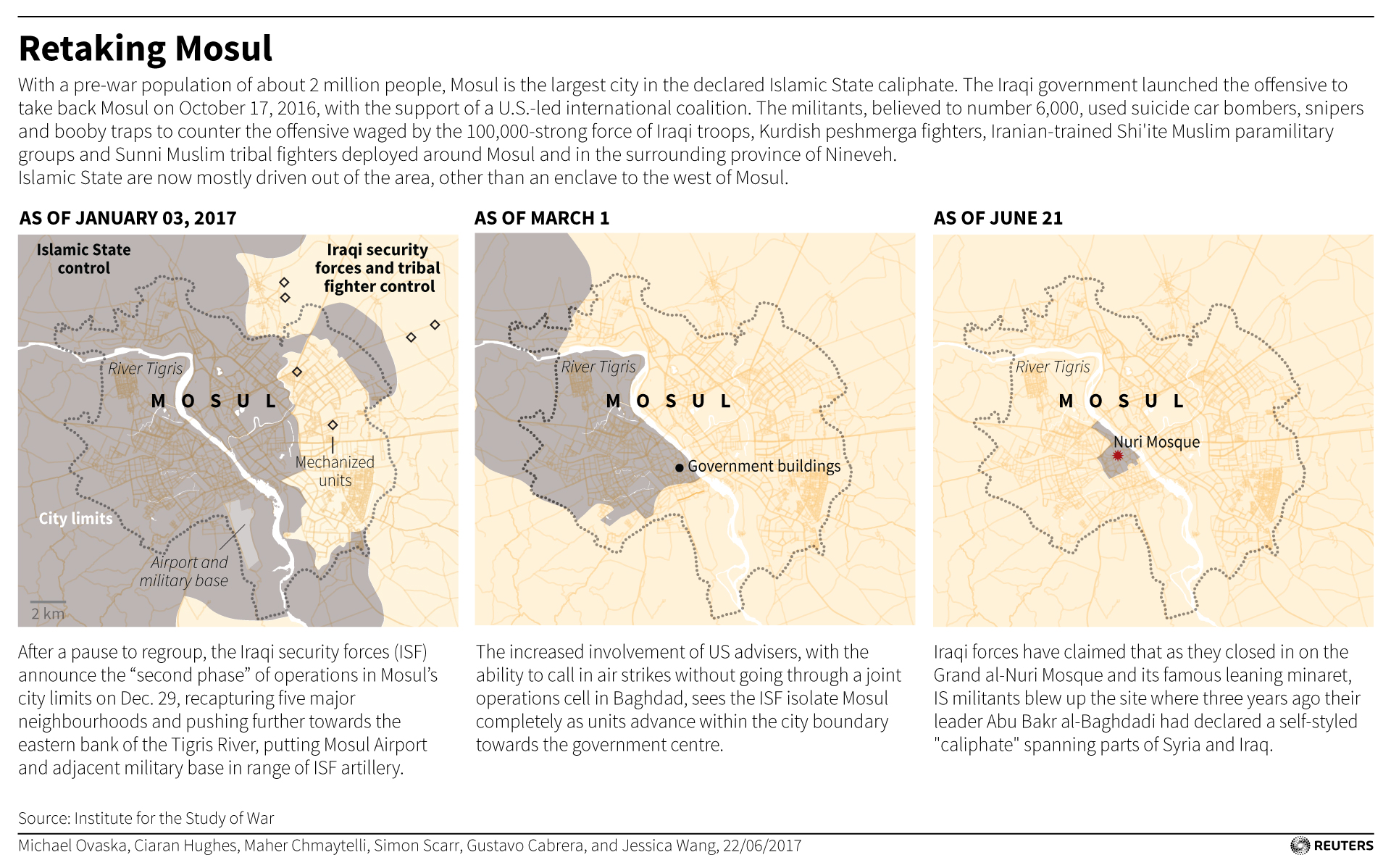
By Stephen Kalin
MOSUL, Iraq (Reuters) – Iraqi forces on Tuesday pushed towards the river side of Mosul’s Old City, their key target in the eight-month campaign to capture Islamic State’s de-facto capital, and Iraq’s prime minister predicted victory very soon.
Iraqi forces, battling up to 350 militants dug in among civilians in the Old City, said federal police had dislodged IS insurgents from the Ziwani mosque and were only a few days away from ousting militants completely from the Old City.
“The victory announcement will come in a very short time,” Prime Minister Haider al-Abadi said on his website on Monday evening.
“The operation is continuing to free the remaining parts of the Old City,” Lieutenant General Abdul-Wahab al-Saadi of the Counter Terrorism Service (CTS) told a Reuters correspondent near the frontline in the heart of the Old City.
Iraqi forces had about 600 meters (2,000 ft) of ground left to cover before reaching Mosul’s Corniche road along the western bank of the Tigris, federal police commander Lieutenant General Raed Shaker Jawdat told Iraqi State TV.
“In a few days our forces will reach Corniche and bring the battle to its conclusion,” said Jawdat.
The fall of the northern Iraqi city would mark the end of the Iraqi half of the “caliphate” proclaimed by Islamic State, though the militant group remains in control of large areas of both Iraq and Syria.
In Syria, the Islamic State-held capital of Raqqa, is virtually encircled by a U.S.-backed, Kurdish-led coalition.
Federal police and elite CTS units in Mosul were battling with IS fighters in the Old City’s maze of narrow alleyways, along with the army and interior ministry units.
Islamic State has lost about half the Old City since the battle for the historic district started ten days ago. About one sq km (0.4 sq mile) remained under its control, according to Iraqi state TV.
The army’s 16th infantry division seized on Tuesday the al-Mashahda quarter, in the northwestern corner of the Old City, and federal police took al-Bayd and Ras al-Jadda, in the southwestern quarter, military statements said.
Up to 350 militants are estimated by the Iraqi military to be dug in the Old City among civilians in wrecked houses and crumbling infrastructure. They are trying to slow the advance of Iraqi forces by laying booby traps and using suicide bombers and snipers.
Those residents who have escaped say many of the civilians trapped behind Islamic State lines — put at 50,000 by the Iraqi military – are in a desperate situation with little food, water or medicines.
A U.S.-led international coalition is providing air and ground support in the eight-month-old offensive.
HUMAN SHIELDS
The Iraqi government once hoped to take Mosul by the end of 2016, but fighting has dragged on as militants have reinforced positions in civilian areas, effectively using residents as human shields.
Hundreds of civilians who managed to escape as the forces advanced into the Old City gathered on the side of the road at the edge of western Mosul on Tuesday.
But hundreds of civilians have been killed in the past month as they tried to flee the Old City.
The militants last week destroyed the historic Grand al-Nuri Mosque and its leaning minaret from which their leader Abu Bakr al-Baghdadi declared a caliphate spanning parts of Iraq and Syria three years ago. The mosque’s grounds remain under the militants’ control.
Iraqi troops on Monday captured the al-Faruq quarter, facing the mosque, the military said.
Only a handful of districts remained to be cleared, al-Saadi said, standing atop a rooftop overlooking al-Faruq street which now marks the frontline, a few dozen meters (yards) from the old mosque.
Sporadic sniper fire could be heard, and an incoming rocket, as the troops used a drone to survey the insurgents’ defenses. The Iraqi forces started attacking the western side of Mosul in February, a month after taking the side located east of the Tigris.
About 850,000 people, more than a third of Mosul’s pre-war population, have fled, seeking refuge with relatives or in camps, according to aid groups.
Islamic State’s Baghdadi has left the fighting in Mosul to local commanders and is assumed to be hiding on the Iraqi-Syrian border. There has been no confirmation of Russian reports over the past days that he has been killed.
The group has carried out sporadic suicide bombings in parts of Mosul using sleeper cells. It launched a wave of such attacks late on Sunday, trying to take control of a district west of the Old City, Hay al-Tanak, and the nearby Yarmuk quarter.
Security forces blocked their attempted fight-back, al-Saadi said.

(Writing by Maher Chmaytelli; Editing by Richard Balmforth)












